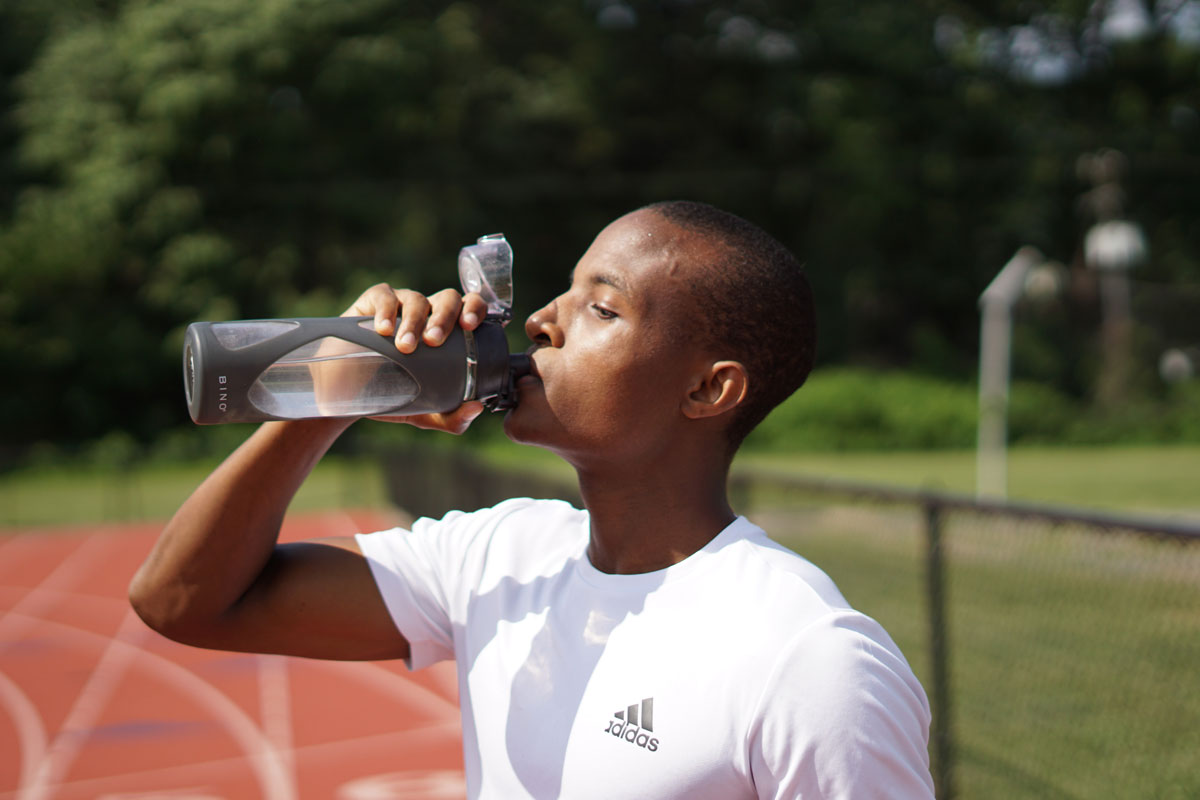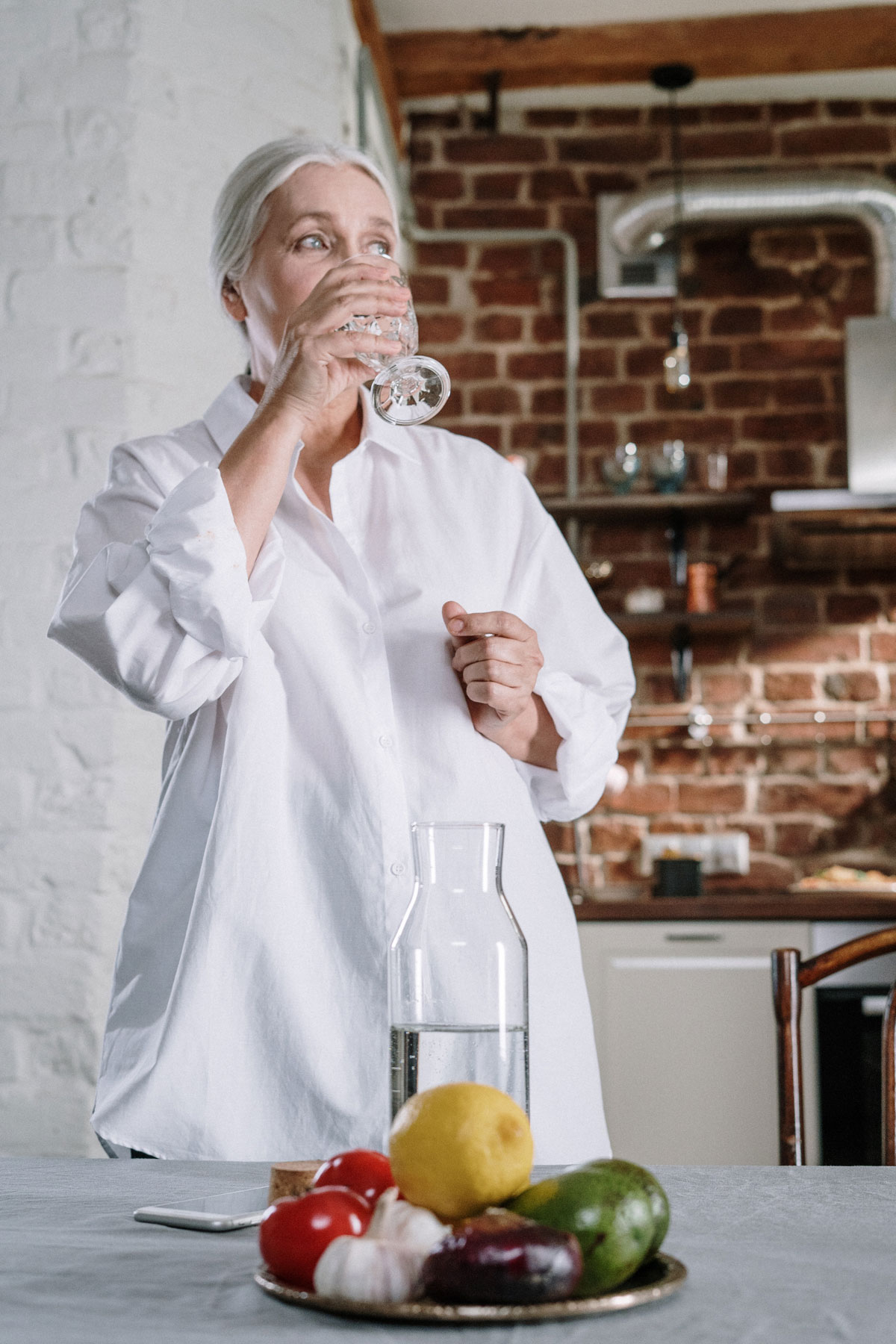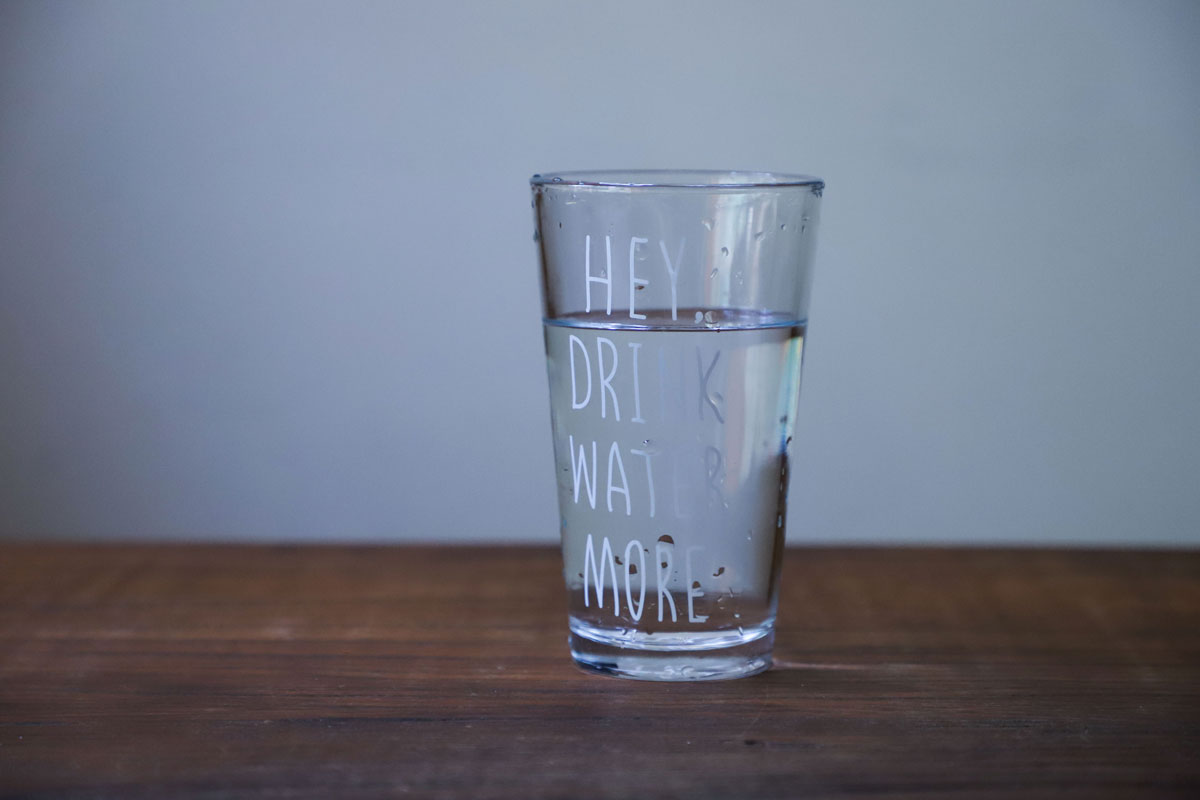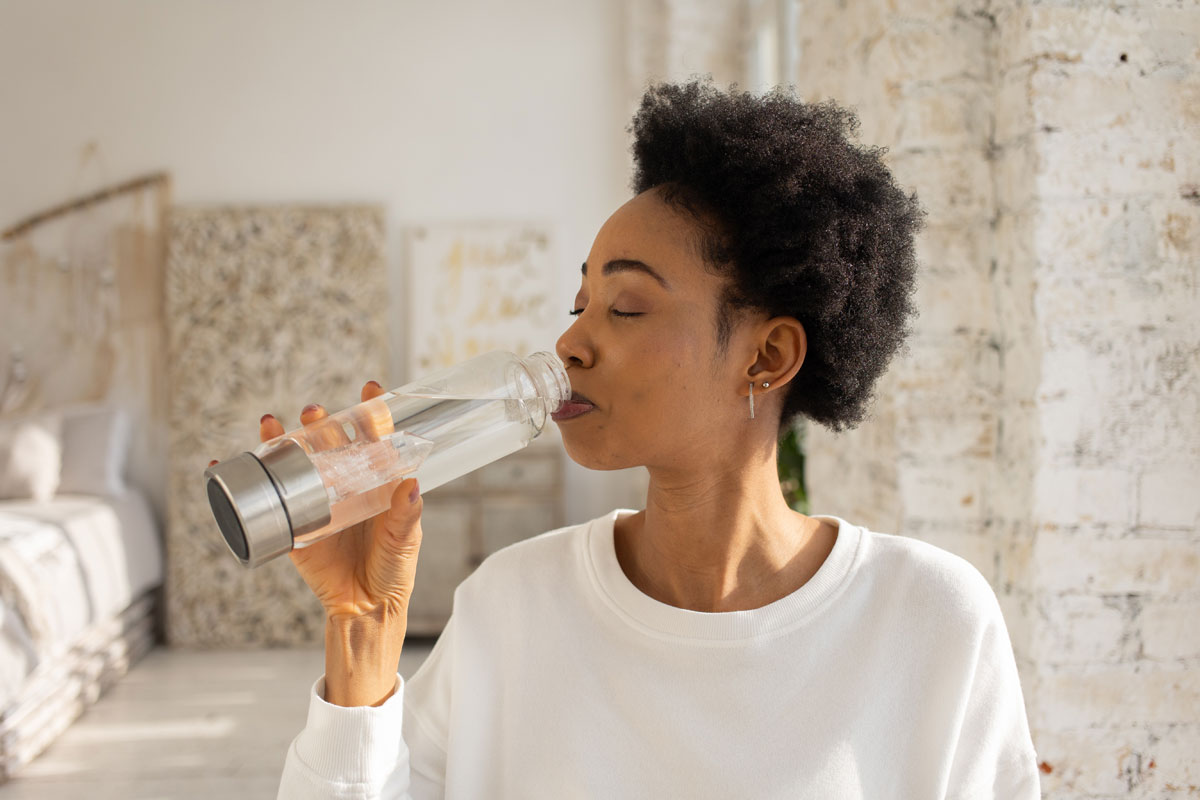
Have you set New Year’s resolutions this year? I’m trying to go easy on myself and set resolutions that are fulfilling. Two of my resolutions are to get a room in my basement finished and go on a vacation. Now that I’m reading coverage of this new study I plan to drink more water too. A new study by the National Institutes of Health published in the journal eBioMedicine examined health data which showed that people with high serum sodium levels, an indication of being dehydrated, had biomarkers that made them seem biologically older than people with ideal serum sodium levels. The high serum sodium group also had higher levels of disease. While the study authors are careful to say this doesn’t mean that being dehydrated ages you or that drinking more water makes you biologically younger, it can’t hurt, right? Here’s part of a writeup on this by CNN:
You may know that being adequately hydrated is important for day-to-day bodily functions such as regulating temperature and maintaining skin health.
But drinking enough water is also associated with a significantly lower risk of developing chronic diseases, a lower risk of dying early or lower risk of being biologically older than your chronological age, according to a National Institutes of Health study published Monday in the journal eBioMedicine.
“The results suggest that proper hydration may slow down aging and prolong a disease-free life,” said study author Natalia Dmitrieva, a researcher in the Laboratory of Cardiovascular Regenerative Medicine at the National Heart, Lung and Blood Institute, a division of NIH, in a news release.
Learning what preventive measures can slow down the aging process is “a major challenge of preventive medicine,” the authors said in the study. That’s because an epidemic of “age-dependent chronic diseases” is emerging as the world’s population rapidly ages. And extending a healthy life span can help improve quality of life and decrease health care costs more than just treating diseases can.
The authors thought optimal hydration might slow down the aging process, based on previous similar research in mice. In those studies, lifelong water restriction increased the serum sodium of mice by 5 millimoles per liter and shortened their life span by six months, which equals about 15 years of human life, according to the new study. Serum sodium can be measured in the blood and increases when we drink less fluids.
Using health data collected over 30 years from 11,255 Black and White adults from the Atherosclerosis Risk in Communities study, or ARIC, the research team found adults with serum sodium levels at the higher end of the normal range — which is 135 to 146 milliequivalents per liter (mEq/L) — had worse health outcomes than those at the lower end of the range. Data collection began in 1987 when participants were in their 40s or 50s, and the average age of participants at the final assessment during the study period was 76.
Adults with levels above 142 mEq/L had a 10% to 15% higher chance of being biologically older than their chronological age compared with participants in the 137 to 142 mEq/L range. The participants with higher faster-aging risk also had a 64% higher risk for developing chronic diseases such as heart failure, stroke, atrial fibrillation, peripheral artery disease, chronic lung disease, diabetes and dementia.
And people with levels above 144 mEq/L had a 50% higher risk of being biologically older and a 21% higher risk of dying early. Adults with serum sodium levels between 138 and 140 mEq/L, on the other hand, had the lowest risk of developing chronic disease. The study didn’t have information on how much water participants drank.
“This study adds observational evidence that reinforces the potential long-term benefits of improved hydration on reductions in long-term health outcomes, including mortality,” said Dr. Howard Sesso, an associate professor of medicine at Harvard Medical School and associate epidemiologist at Brigham and Women’s Hospital in Boston, via email. Sesso was not involved in the study.
However, “it would have been nice to combine their definition of hydration, based on serum sodium levels only, with actual fluid intake data from the ARIC cohort,” Sesso added…
“Decreased body water content is the most common factor that increases serum sodium, which is why the results suggest that staying well hydrated may slow down the aging process and prevent or delay chronic disease.”
CNN has more analysis at the source, so I would suggest you read it at the source if you’re interested. As their quoted expert mentioned, I would like to know the fluid intake of the people with low serum sodium levels, however it’s not possible using retrospective health data collected over 25 years. I’m excited about this study since drinking more water is such an easy change to make! My friend uses a free app called Water Drink Reminder (not an ad) to track his fluid intake and I installed it yesterday. I drink so much that I met my goal of 67 ounces by lunchtime. It does count coffee though so it doesn’t hurt to drink more than that.
Photos via Pexels and credit: Cottonbro Studios, Cats Coming, Ekaterina Bolovtsova, Nigel Msipa














Drink all day, pee all night and increase your chance of falling while making your way to the bathroom in the dark.
So true! I have a cut off time of 3pm at work so I can make the long commute home and 7pm at home so I can sleep.
Please also be aware that fresh fruits and vegetables also count toward hydration! Many people do not eat enough produce.
THIS. I don’t understand why pro-water articles don’t talk about this more. You can get hydration from foods — vegetables and fruits. And on top of that, ANTIOXIDANTS!!! Want hydration, beautiful skin, less wrinkles, eat more fruits and veggies!
CB, I’m torn on the app including coffee, seeing as caffeine is a diuretic that draws water from your system. BUT many other studies show the positive brain health effects of drinking X cups of caffeinated coffee or green tea every day. Does the app also count sugar-free sodas, which have been shown in some studies to be as bad for you as sugared ones? ML, that’s a great point about the fruits and veggies counting too. Time to eat more homemade veggie soups for lunch.
For me, I add a splash of unsweetened organic cranberry or pomegrate juice to the water. I don’t use any artificial flavour things, even if they claim to be all natural.
Hi @Nota, I’m a longtime reader who’s enjoyed your excellent comments for years now. Just popping in to say that apparently coffee and tea aren’t as diuretic as we previously thought, and really do hydrate.
(Mayo clinic source: https://www.mayoclinic.org/healthy-lifestyle/nutrition-and-healthy-eating/expert-answers/caffeinated-drinks/faq-20057965)
One of my goals this year is to stop buying that bag of spinach or kale or greens that slowly punishes in my fridge. And reading your comment I realized: Make soup!
Thank you!
Queen Meghan’s Hand–if you have a slow cooker, you can make almost any dish in that–and throw in the greens. I made some lasagna with spinach to clear out the produce bin–yum!!
I throw fading veggies into soups or I make an egg casserole for the week with them. Also – smoothies! You can just freeze the fresh spinach and then throw it when you’re making one.
If I want a soda I drink unflavored sparkling water with a splash of fruit juice or lemonade and a small handful of frozen berries. If I put it in a wine glass I can pretend to have a cocktail.
JerseyCow, that was really sweet of you to write. Thank you!
Queen’s Meghan’s Hand, I’ve found spinach, power greens, kale, arugula wilt down to almost invisible in soup and pasta sauce. Great place to hide them. Did you watch any of the Stanley Tucci Italy food show? They did one recipe of pasta with lemon and rocket (arugula) which is amazing. You can use olive oil instead of butter for a healthier version.
I didn’t watch Tucci’s show but I’m looking up the recipe now!
Coffee is high in potassium, which is an important electrolyte, especially if someone is drinking a lot of water and flushing out their electrolytes.
I’m drink tonnes of water so I’m pleased about this. I am always reminding people to drink more water and my son drinks a lot of water as a consequence of me always having a glass nearby. It’s the one of the best and easiest things you can do. Your pee should be almost transparent!!!
I have been pretty consistent with my water intake for the last 15 years. I have one cup of coffee, one Diet Pepsi (I’ll never give it up) and five 19oz water bottles a day. I start right when I wake up before my run and finish by 5pm so I’m not going to the bathroom all night. It was the smallest and easiest thing I did to improve my life and health as I got older.
I have always drunk lots of water once I learned in primary school that it was good and have barely any wrinkles.
Also never sunbathed and almost never wear make-up. People often think I’m 10 or more years younger than I am.
(not saying I’m some kind of great beauty, because I’m definitely not 😀 but that is the one thing that goes well).
Best way for me to drink it, is to always have it around. It’s much easier to take a few sips when it’s already on your desk than if you have to walk to a (office) kitchen to get it.
Lucky thing is that tap water is very clean here and good to drink.
This is welcome news as I’m a big water drinker! I drink a lot of unsweetened herbal teas (hot in the winter and cooled in the summer) peppermint and fennel are my faves.
I have a 33 oz stainless steel bottle nearly attached to my hand. I drink three fills most days -it comes everywhere with me. My kids grew up with water in their sippy cups so they are big water drinkers, too. 56 and my skin looks amazing- the tone definitely changes when I don’t drink enough- starts to look blotchy & uneven. Hooray for water!
This is great as I only drink oat milk or filtered water. Keeping it on my desk at work helps to keep drinking throughout the day.
This study is about dehydrated people. If you are drinking water when you are thirsty, you are not dehydrated. All the liquid content of everything you eat and drink is turned into water by the body.
There is this drive in the media to turn every medical study into some change that you need to make in how you live your life. It feeds into a culture of diet pseudoscience, people over obsessing about their own and other people’s bodies, and is just crazy making in general.
There was a huge push for runners to hydrate and get enough water, so as not to risk dehydration. The result is that we now have runners collapsing and dying from electrolyte imbalances caused by over hydration. More people have died from taking the advice to drink lots of water during a race than had previously died of dehydration.
Yes, as my pharmacology teacher used to say: you drink more, you pee more. Between water, coffee, produces we eat and so on, it shouldn’t be tough to have enough water to stay properly hydrated.
Of course, many schools and workplaces encourage dehydration because pee time is seen as unproductive; that’s where the issues are. You shouldn’t have to only be allowed to go to the bathroom during breaks and thus adjust your liquid intake in consequences, kids shouldn’t have to ask permission to go to the bathroom at school, they should just be allowed to go when they need to, excusing yourself in the middle of a 3-hrs meeting is fine too. Making sure our workplaces are humane and allows us to deal with bodily functions is the best way to ensure proper hydration.
Thank you for this! We have to view everything through this myopic lens of self-betterment (and filtered through media outlets that don’t know how to report on science).
“The study didn’t have information on how much water participants drank.“
😂